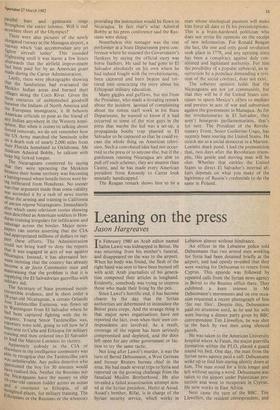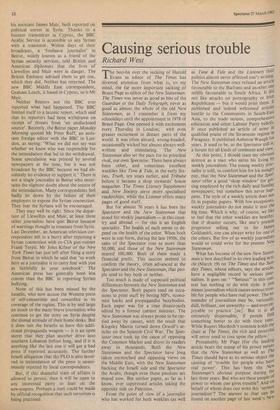Leaning on the press
Jason Hargreaves
In February 1980 an Arab editor named Salim Lawzi was kidnapped in Beirut. He was returning from his mother's funeral, and disappeared on the way to the airport. When his body was found, the flesh of the right hand was seen to have been burned off with acid; Arab journalists of his genera- tion composed their articles in longhand. Evidently, somebody was trying to impress those who made their living by the pen.
Since Lawzi's horrific end, it has become clearer by the day that the Syrian authorities are determined to intimidate the Beirut press corps. And the strange thing is that major news organisations have not reported the fact, even when their own cor- respondents are involved. As a result, coverage of the region has been seriously compromised and depleted, and the door left open for any other government or fac- tion to try the same tactic.
Not long after Lawzi's murder, it was the turn of Bernd Debusmann, a West German and former Reuters bureau chief in the area. He had made several trips to Syria and reported on the growing challenge from the fanatical Muslim Brotherhood. He also revealed a failed assassination attempt aim- ed at the Syrian president, Hafez al Assad. Assad's brother, Rifat, is in charge of the Syrian security service, which works in Lebanon almost without hindrance.
An officer in the Lebanese police told Debusmann that two armed men working for Syria had been detained briefly at the airport, and had openly revealed that they were waiting for Debusman to return from Cyprus. This episode was followed by repeated calls from the Syrian news agency in Beirut to the Reuters office there. They exhibited a keen interest in Mr Debusmann's movements and on one occa- sion requested a recent photograph of him `for our files'. Despite this, Debusmann paid no attention until, as he and his wife were leaving a dinner party given by BBC correspondent Tim Llewellyn, he was shot in the back by two men using silenced pistols.
He was taken to the American University hospital where Al Fatah, the major guerrilla formation within the PLO, placed a guard round his bed. One day, the man from the Syrian news agency paid a call: Debusmann woke up to find him staring silently down at him. The man stood for a little longer and left without saying a word. Debusmann was taken to the airport under Palestinian pro- tection and went to recuperate in Cyprus. He now works in East Africa.
Next came the turn of the BBC. Tim Llewellyn, the resident correspondent, and
his assistant James Muir, both reported on political unrest in Syria. Thanks to a booster transmitter in Cyprus, the BBC Arabic Service is accessible to any Syrian with a transistor. Within days of their broadcasts, a 'freelance journalist' in Beirut, widely known as a friend of the Syrian security services, told British and American diplomats that the lives of Llewellyn and Muir were in danger. The British Embassy advised them to get out, which they did. Neither has returned. The new BBC Middle East correspondent, Graham Leach, is based in Cyprus; so is Mr Muir.
Neither Reuters nor the BBC ever reported what had happened. The BBC limited itself to a laconic report, which said that its reporters had been withdrawn on receipt of threats from 'an undisclosed source'. Recently, the Beirut paper Monday Morning quoted Mr Peter Ruff, an assis- tant foreign editor with the BBC in Lon- don, as saying: 'What we did not say was whether we knew who was responsible for the intimidation that led to the withdrawal. Some speculation was printed by several newspapers at the time, but it was not broadcast by the BBC because we had ab- solutely no evidence to support it.' There is not a single journalist in Beirut who enter- tains the slightest doubt about the source of the intimidation. Many correspondents feel badly let down by the failure of their employers to expose the Syrian connection. They fear the Syrians will be encouraged.
They may well be right. Since the depar- ture of Llewellyn and Muir, at least three other journalists have quit Beirut because of warnings thought to emanate from Syria. Last December, an American television cor- respondent left in a hurry after reporting a Syrian connection with ex-CIA gun-runner Frank Terpil. Mr John Kifner of the New York Times has just left after filing a story from Beirut in which he said that 'to work here as a journalist is to carry fear with you as faithfully as your notebook'. The American press has generally been less craven than the BBC in reporting Syrian bullying.
None of this has been missed by the Israelis, who now accuse the Western press of self-censorship and cowardice in its coverage of the region. This is by and large an insult to the many brave journalists who continue to get the story on Syria despite the dismal attitude of their home desks. But it does suit the Israelis to have this addi- tional propaganda weapon — it is an open secret that they plan another drive into southern Lebanon before long, and if it is anything like the last one it will get a bad press if reported accurately. The further Israeli allegation that the PLO is also invol- ved in intimidation of the press is unani- mously rejected by local correspondents.
But, if this shameful state of affairs is allowed to persist, then it will be open to any interested party to lean on the newspapers. Perhaps a start could be made by official recognition that such terrorism is being practised.





































 Previous page
Previous page